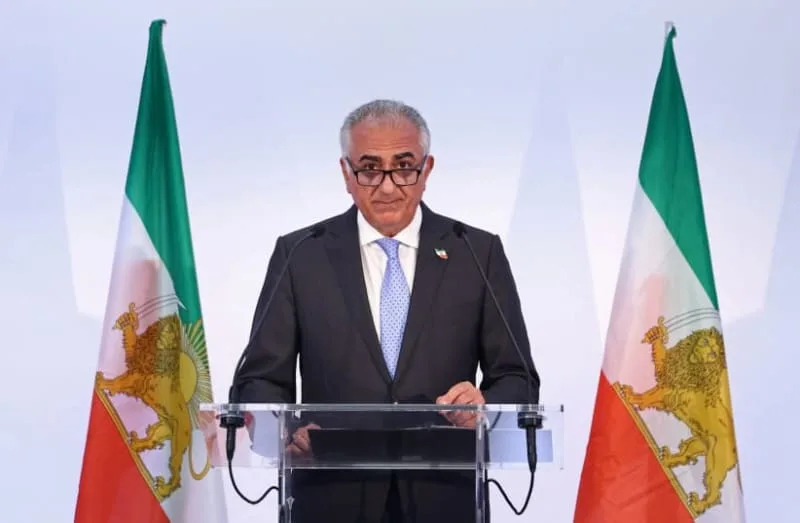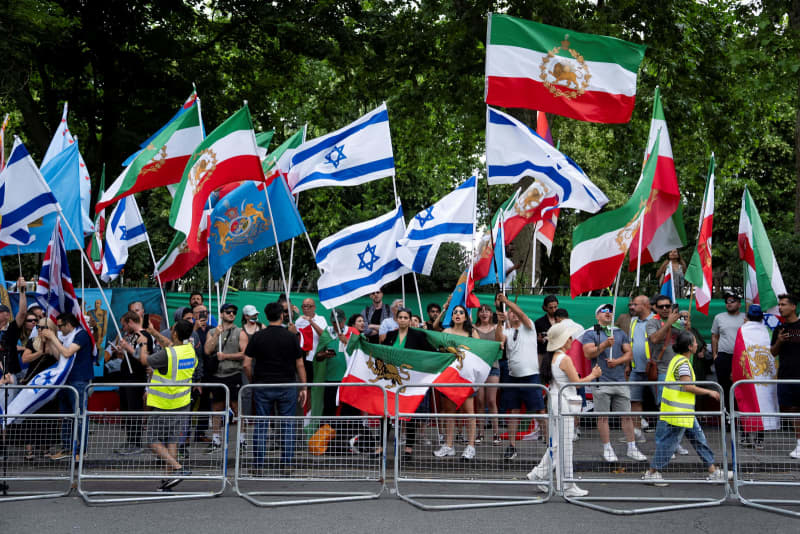Israeli and Iranian officials met and discussed mutual hopes for peacemaking and collaboration should Tehran experience a regime change.
“A regional vision without the Islamic Republic is a vision we and the Iranian people share—and today that vision is closer than ever,” declared Israel’s Minister of Science and Technology Gila Gamliel, after meeting an Iranian opposition delegation at the Beyond the Horizon 2025 conference in Jerusalem. She spoke of advancing the “Cyrus Accords,” as a continuation of the Abraham Accords, an agreement that could usher in a new era of prosperity once the regime in Tehran, it is gone.
This meeting was not symbolic alone. For the first time, Iranian opposition figures, representing Crown Prince Reza Pahlavi, traveled openly to Israel to explore practical cooperation in science, technology, and water. Their visit follows an extraordinary chorus of messages sent just weeks earlier by Israelis from across the political spectrum—Prime Minister Benjamin Netanyahu, senior ministers, diplomats, and former prime minister Naftali Bennett—expressing solidarity with the Iranian people. Words of friendship are now taking root in action, deepening a relationship that terrifies Ali Khamenei precisely because it reveals a future where Iranians and Israelis stand as allies, not enemies.
That vision of two nations once divided by hostility, standing together as partners, is not just a hopeful dream. It is a realistic path forward—one that could transform the Middle East. The day Iran is free, when the walls of mistrust finally crumble, we can do more than simply reopen embassies. Together, Iran and Israel can reshape the region and beyond.
My respect for Israel is not only rooted in our shared history that stretches back to the time of Cyrus the Great. It is also born of deep admiration for how its wise leaders transformed a small nation, perpetually surrounded by threats, into a powerhouse of technology, advanced agriculture, and water management. Israel is a country with limited natural resources that today enjoys a GDP per capita of almost $55,000. For Iranians, this may seem like a distant benchmark, but it is entirely within reach.
Collaboration could lead to mutually-assured greatness
The potential for cooperation between our two nations is unmatched. Iran has vast untapped oil and gas reserves, rare mineral wealth, a young and highly educated population renowned for excellence in mathematics and engineering, and an eight-million-strong diaspora that leads major companies and research centers worldwide. If we combine these strengths with Israel’s technological edge, we could build economic networks stretching from the Persian Gulf to the Mediterranean, transform water and agriculture, reshape the region’s energy future, and move from competitors in innovation to joint leaders.

Reza Pahlavi, the exiled son of the last Shah of Iran, speaks during a press conference about the situation in Iran and the need to support Iranians, in Paris, France, June 23, 2025. (credit: REUTERS/Abdul Saboor)
Picture direct flights between Tehran and Tel Aviv—scientists, entrepreneurs, and tourists traveling freely between our countries. Joint projects on the shores of the Persian Gulf and the Mediterranean. Iranian and Israeli forces standing side by side in humanitarian drills and disaster relief operations. On that same day, Israeli visitors could walk through Isfahan’s Naqsh-e Jahan Square, sip tea in Tabriz’s historic bazaar, and stand atop Persepolis in Shiraz, while Iranians could wander Jerusalem’s Old City, enjoy Tel Aviv’s seaside cafes, and admire the Bahá’í gardens in Haifa. These exchanges, whether in science, security, or culture, would weave bonds of friendship and understanding that no politician could break.
Iran and Israel should not settle for mere normalization. As Crown Prince Reza Pahlavi outlines in his 100-Day Emergency Phase Booklet for post-regime change, our nations should aim for a true strategic alliance, one similar to the enduring partnership between the United States and Israel, standing shoulder to shoulder in times of prosperity and in moments of hardship. Tens of thousands of Iranian Jews living in Israel, Europe, and around the world can serve as cultural ambassadors between our peoples.
A great partnership is within reach
Together, we can grow our economies, improve the quality of life for our citizens, and strengthen our nations’ security and standing on the global stage. But this vision will only be possible in a free Iran. The struggle for liberation must be fought and won by the Iranian people themselves, yet the steadfast support of a smart and powerful ally like Israel will be an essential lifeline. The truth is clear: when the people of Iran and the State of Israel unite, the fall of the Islamic Republic will be inevitable.
Israel can also be assured that, on the day after the regime’s collapse, the leadership of the transition will be in the hands of a figure like Crown Prince Reza Pahlavi—a man whose friendship, and that of his family, with the Jewish people and the State of Israel spans decades. He has a clear record and the full trust of Iranian Jews.
That is why I believe this dream of friendship is within reach. Together, we can close the shameful 47-year chapter of hostility, a dark parenthesis in Iran’s history, and open a new era of friendship, cooperation, and shared prosperity. This is the vision embodied in the idea of the Cyrus Accords: a future where Iranians and Israelis stand not as adversaries, but as partners, two nations shaping a more peaceful and prosperous Middle East.
Navid Mohebbi is a Washington-based Iran analyst and democracy advocate, focusing on domestic and foreign policy issues.
